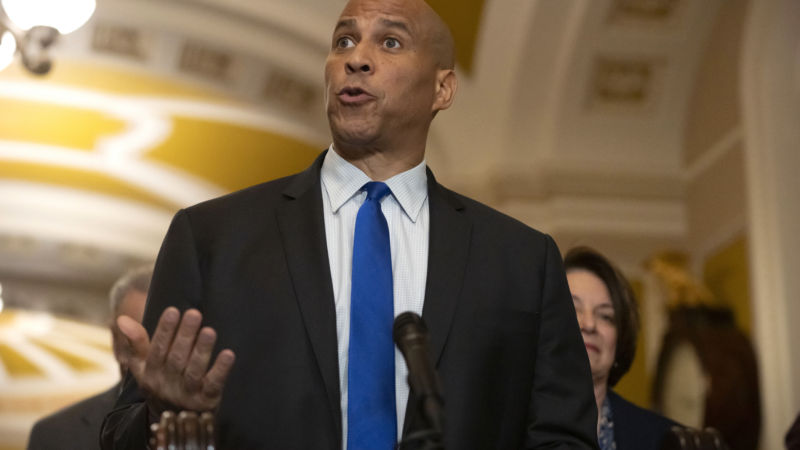Cory Booker’s anti-Trump speech on the Senate floor has lasted 15 hours and counting
Sen. Cory Booker spent Monday night on the Senate floor, delivering a nonstop speech protesting the Trump administration’s policies.
The New Jersey Democrat took the podium at 7 p.m. EDT, vowing to speak “for as long as I am physically able.” He was still standing — with glasses on and papers in hand — as of 10 a.m. on Tuesday, taking periodic breaks by yielding to questions from several fellow Democrats.
As of 10 a.m., over 32,000 people were watching Booker’s live stream on YouTube.
“I’ve been hearing from people all over my state and indeed all over the nation calling upon folks in Congress to do more, to do things that recognize the urgency, the crisis of the moment,” Booker said in a video posted to social media beforehand. “And so we all have a responsibility, I believe, to do something different, to cause — as [late Rep.] John Lewis said — ‘good trouble,’ and that includes me.”
Booker’s speech took aim at President Trump, White House senior adviser Elon Musk and policies he says show a “complete disregard for the rule of law, the Constitution, and the needs of the American people.”
It covered a wide range of topics overnight, from healthcare and Social Security to immigration, the economy, public education, free speech and foreign policy. And it included portions of letters that Booker said he had received from affected constituents, as well as public comments from world leaders, in recent weeks.
“In just 71 days, the president has inflicted harm after harm on Americans’ safety, financial stability, the foundations of our democracy, and any sense of common decency,” Booker said in his introductory remarks. “These are not normal times in our nation. And they should not be treated as such in the United States Senate.”
Trump and Musk have not commented publicly on Booker’s speech as of Tuesday morning. It comes at a tense time for Booker’s party: Nine Democrats joined with Republicans to pass a Trump-backed spending bill last month, preventing a government shutdown but alienating constituents who want lawmakers to push back against the president’s agenda.
What are the rules?
The use of long speeches to delay legislation, known as a filibuster, is a time-honored tradition in the Senate. But that’s not technically what Booker’s speech is, since he is not trying to block a specific bill or nominee.
Under Senate rules, unless special limits on debate are in effect, a senator who has been recognized by the presiding officer can speak for as long as they wish, according to the Congressional Research Service (CRS).
“They usually cannot be forced to cede the floor, or even be interrupted, without their consent,” it says.
There are a few requirements they must meet, however. For one, the senator must “remain standing and must speak more or less continuously,” the CRS says, which becomes more difficult as the hours pass.
Sen. Chris Murphy, D-Conn., tweeted Monday night that Booker had employed an “interesting tactic” to that effect.
“Cory had a Senate page take his chair away to eliminate any temptation to sit down,” he wrote, just under three hours into the speech.
Booker employed another strategy at various points: permitting colleagues to ask questions, which is the only way a senator can yield without losing the floor. But it’s only partial relief, the senator must remain standing while others are talking.
Booker yielded the floor periodically to several Democrats, including Murphy, Senate Minority Leader Chuck Schumer, Sen. Andy Kim of New Jersey, Sen. Peter Welch of Vermont, Sen. Kirsten Gillibrand of New York, Georgia Sen. Raphael Warnock, Minnesota Sen. Amy Klobuchar and Sen. Chris Coons of New Hampshire.
How long can these speeches go?
The New York Times reports that Booker’s speech could disrupt official business if it continues past noon, when the Senate is scheduled to convene.
At 12 hours and counting, it’s certainly a marathon effort. But it’s nowhere near the longest to grace the Senate floor in recent history.
Murphy led Democrats in a push for gun control legislation that lasted 15 hours after the Orlando Pulse nightclub shooting in 2016.
Republican Sen. Ted Cruz of Texas held the floor for 21 hours and 19 minutes as he advocated unsuccessfully for defunding Obamacare in 2013 — more than eight hours longer than Kentucky Republican Rand Paul did when he filibustered John Brennan’s CIA nomination months earlier.
The longest filibuster on record was a 1957 speech by then-Democratic Sen. Strom Thurmond of South Carolina — in opposition to the Civil Rights Act — that lasted for 24 hours and 18 minutes.
Media reported at the time that Thurmond sustained himself with “diced pumpernickel and bits of cooked hamburger” and sips of orange juice. His aides set up a bucket in the cloakroom so he could keep a foot on the Senate floor if he needed to relieve himself.
America’s top figure skaters dazzled St. Louis. I left with a new love for the sport.
The U.S. Figure Skating National Championships brought the who's who of the sport to St. Louis. St. Louis Public Radio Visuals Editor Brian Munoz left a new fan of the Olympic sport.
DHS restricts congressional visits to ICE facilities in Minneapolis with new policy
A memo from Homeland Security Secretary Kristi Noem, obtained by NPR, instructs her staff that visits should be requested at least seven days in advance.
Historic upset in English soccer’s FA Cup as Macclesfield beat holders Crystal Palace
The result marks the first time in 117 years that a side from outside the major national leagues has eliminated the reigning FA Cup holders.
Venezuela’s exiles in Chile caught between hope and uncertainty
Initial joy among Venezuela's diaspora in Chile has given way to caution, as questions grow over what Maduro's capture means for the country — and for those who fled it.
Sunday Puzzle: Pet theory
NPR's Sacha Pfeiffer plays the puzzle with KAMW listener Daniel Abramson of Albuquerque, N.M, and Weekend Edition Puzzlemaster Will Shortz.
Inside a Gaza medical clinic at risk of shutting down after an Israeli ban
A recent Israeli decision to bar Doctors Without Borders and other aid groups means international staff and aid can no longer enter Gaza or the West Bank. Local staff must rely on dwindling supplies and no international expertise.








